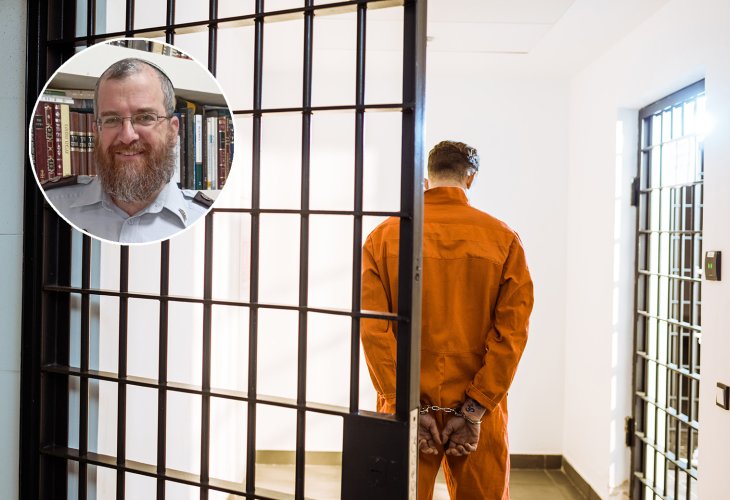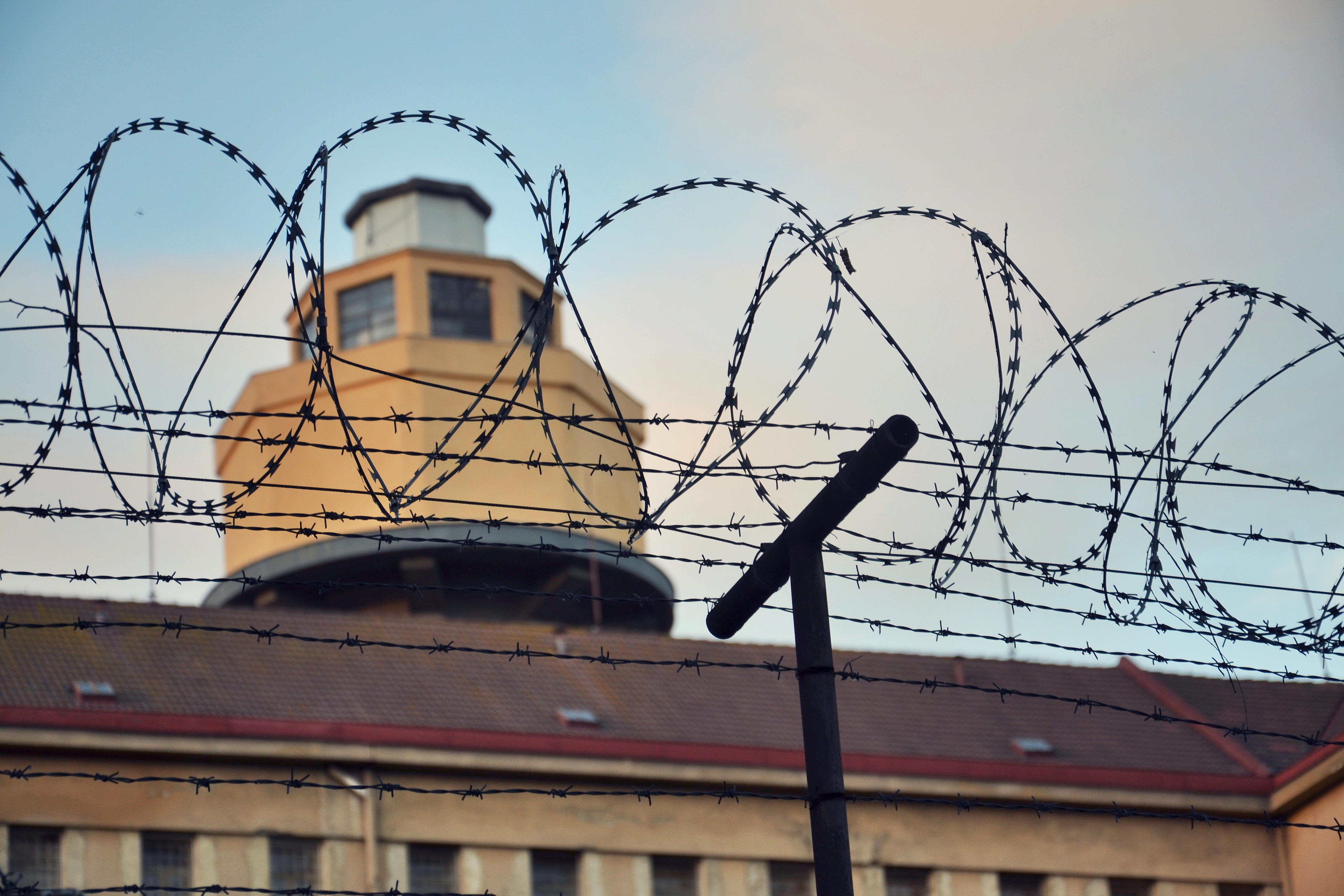Bringing Light to Incarcerated Souls: Rabbi Eyal Ben David’s Mission in Israeli Prisons
Rabbi Eyal Ben David has been serving as a prison rabbi for seven years and was recently appointed as the chief rabbi of Eshel Prison. In a special interview, he talks about the transformative power of Torah study for inmates, the unique challenges of prison ministry, and the joy of instilling hope where it is most needed.
 In the circle: Rabbi Eyal Ben David (Background photo: shutterstock)
In the circle: Rabbi Eyal Ben David (Background photo: shutterstock)A group of people sitting and studying Torah with open volumes of Talmud is not an uncommon sight, thank Hashem. But when these learners are life-sentenced inmates, among the most dangerous housed in Israeli prisons, who are now engaged in rehabilitation, it becomes a profoundly moving picture. Overseeing this complex scene is Rabbi Eyal Ben David, the rabbi of Eshel Prison.
"In the religious study halls within the prison, the inmates study according to structured study cycles," he explains in an interview with 'Hidabroot.' "There are four study cycles a year. Study sessions are conducted even in the most complex prison wings, where inmates serve long sentences for severe offenses—yet even there, they learn with our seminary teachers. Upon completion of their studies, we present them with certificates bearing my signature and that of the prison commander."
"At one certificate ceremony," Rabbi Ben David recounts, "an inmate approached me and said, 'Rabbi, this is the first time I've ever received a certificate.' I thought to myself, a person who has never been told 'you're good'—what could we expect from him? That's exactly our mission: to give them light and faith in themselves."
Rabbi Ben David has been involved in prison rabbinical roles for seven years. Last year, he was appointed the chief rabbi of Eshel Prison. "There is quite a bit of sacred work here," he notes. "Whether it's providing religious needs to inmates or offering personal talks when an inmate shares their struggles, and trying to assist however we can—whether spiritually or practically."
What's your role within the prison rabbinate?
"We have a network of seminaries where inmates come to study each morning. In this framework, we offer them a structured curriculum that is disseminated weekly through the rabbinical headquarters in Netivot. Through learning, we bring the light of Torah into the hearts of the inmates. We believe it is the only light that can change behavior patterns and lead them to choose a better path after release."
"Beyond the seminaries," Rabbi Ben David says, "we strive to assist inmates with all their religious needs and offer help with anything they require. We recently completed the Purim holiday, where we needed to ensure they had a Megillah reading. Before that, we had to ensure they had a reading of Parashat 'Zachor'. Reading this Torah portion is simple for anyone outside prison, but here everything is complex. Moreover, there are wings where inmates are each in complete isolation. As we know, reading the Parashat Zachor is a Torah commandment, so we do not neglect even those inmates. We brought a Torah scroll to them on the Fast of Esther and arranged a prayer quorum to ensure each inmate could partake in the mitzvah."
"'Hidabroot' bulletins also regularly reach us," surprises the prison rabbi. "We receive the bulletins, and the inmates eagerly await them. When I speak of 'inmates,' I sometimes mean those who are alone for 23 hours a day. You don't have to imagine much to understand their daily struggles. This hardship intensifies during Shabbat. For them, each bulletin is a world unto itself. It’s not surprising they look forward to it. For us, it’s also an act of kindness towards these individuals, and it brings them a sense of Shabbat, even in their lowly state."

"In one instance," recalls the rabbi, "we didn't receive enough bulletins, and there was a dispute among inmates over who would get them. Since then, we've made sure that we never run out. Thus, as I said, we deliver the Shabbat atmosphere."
What halachic questions come to you?
"Naturally, in a place like prison, many halachic questions arise throughout the year, but they increase during the holidays. As Passover approaches, questions arise regarding preparing the space and eating legumes during the holiday—everyone according to their custom. Purim also led to halachic inquiries."
The rabbi mentions that "there are also questions that are hard to digest. Once, an inmate serving a life sentence came and asked how he might seek forgiveness from someone he had wronged severely and who was no longer alive. He later asked me to help find that person's grave so he could ask for forgiveness. I made sure not to judge him. It was very difficult, but as we know, the Jewish spark resides within every Jew."
"Ignoring Inmates' Pasts"
How does Torah study impact the inmates?
"Its impact is significant, and it serves as genuine rehabilitation. Moreover, studies over the years have shown that religious rehabilitation has greater success rates than regular rehabilitation. It can't be measured by specific things like talking to rabbis or a Shabbat bulletin, but generally, we see that all the building of this spiritual system, layer upon layer, helps turn the inmate into a different person from the one who entered prison."
In conclusion, the rabbi states: "We went through Purim, during which we read the Scroll of Esther, where it says, 'For the Jews, there was light and joy and gladness and honor.' The sages interpret 'light as Torah,' because the Torah possesses a light capable of penetrating the most closed walls and complex areas. We see this clearly."
Are there inmates who become closer to Judaism while in prison?
"Absolutely. For example, it’s often inspiring for me to see their prayers. In the wing, you might see inmates praying an ordinary weekday Mincha, but it looks more like a 'Neila' prayer of Yom Kippur. We know that Yom Kippur is the Day of Judgment, and they can experience a Day of Judgment—differentiated—multiple times a year when they are called for court sessions."
"In general, many in prison grow closer to Judaism and strengthen themselves. I’m talking even about individuals who outside were prominent figures in criminal organizations, and here they are in a completely different place. Because, in the end, most in prison realize they made a mistake that led them here, and no one enjoys being in prison."
 (Photo: shutterstock)
(Photo: shutterstock)Do you have contact with released inmates?
"Generally, we're not permitted to maintain contact with released inmates. But we often know what's happening with them. We have community connections, and before release, we direct inmates to various religious frameworks where they will continue after being released. From these frameworks, we learn they continue attending Torah classes and connect to different communities. Belonging to a community is very significant for a released inmate. Unlike someone who leaves the prison and enters the open world without anyone really waiting for them, an inmate who joins a community has a communal support system and a rabbi who supports and strengthens them."
Isn't it personally difficult for you to work in a prison?
"It's not always easy," the rabbi replies. "An inmate once joked with me: 'I’ll be released in five years, and you have a lot more time here'...
"It's also important to understand that everything that seems simple outside is complex here and requires a series of approvals. For example, the rabbinate works alongside the headquarters officers and the prison command regarding everything we seek to accomplish in prison. Recently we brought an orchestra for the inmates, and their entry required approvals. Moreover, it is necessary to instruct those entering what is forbidden and what is permitted in prison."
Still, what are the feelings about working alongside inmates, some of whom have committed very serious crimes?
"There's no doubt that this question crosses our minds often, and it's not easy to spend a lot of time in the presence of people who have sinned. But when I'm aware of the challenges in this place, and with many prayers, I can maintain my spiritual and physical stance."
"I strive to ignore the reason for an inmate's imprisonment and focus on the inmate's well-being, knowing it is my duty. Besides, I try not to know why inmates are in prison. Only when I need that information for my role, will I look into an inmate's imprisonment motives, but generally, I avoid it—for this very reason, to remain as 'clean' as possible with that inmate."
To conclude, can you share a story that touched you?
"In the prison, a man was incarcerated for many years for refusing to grant his wife a 'Get' (religious divorce). After eight years, we managed to convince him to give the 'Get'. There were also inmates who wished to marry within the prison walls, and we provided them with the spiritual support. It’s a joyous and profoundly moving event, offering hope for different lives post-release from prison. There are also cases of adult inmates choosing to undergo circumcision while in prison."
"Of course, all our activities are carried out with the assistance of the rabbinical headquarters at the commission," Rabbi Ben David adds towards the end, "we have a regional rabbi who always ensures to provide the best assistance. And we hope our work will soon become unnecessary."
You, too, can be part of a leading unit of the world’s largest spiritual army. Seize the opportunity to accumulate many merits. One phone call, and you’re part of the team. The first month is free! Call 073-222-1388 or click here.

